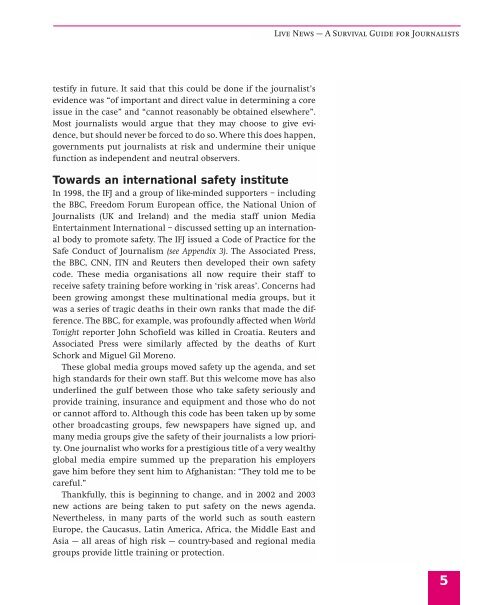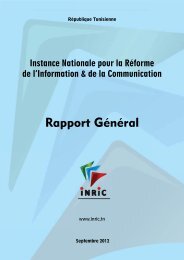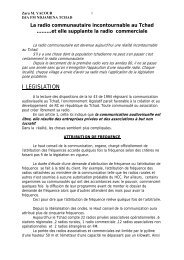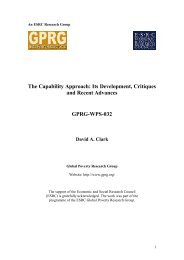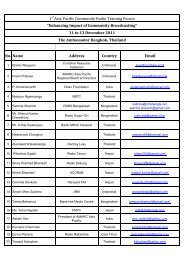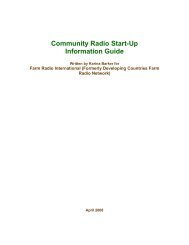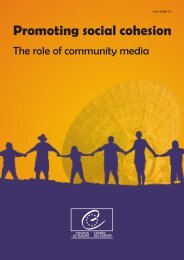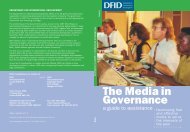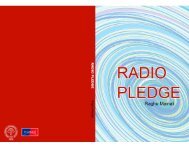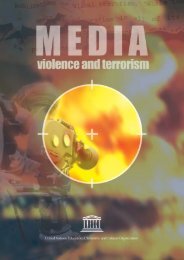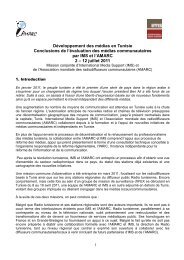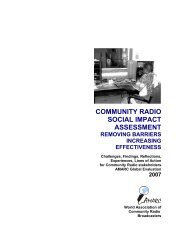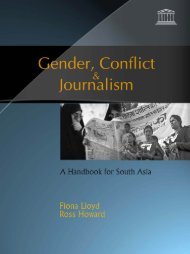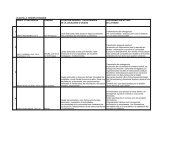Live News - A Survival Guide - International Federation of Journalists
Live News - A Survival Guide - International Federation of Journalists
Live News - A Survival Guide - International Federation of Journalists
- No tags were found...
Create successful ePaper yourself
Turn your PDF publications into a flip-book with our unique Google optimized e-Paper software.
<strong>Live</strong> <strong>News</strong> — A <strong>Survival</strong> <strong>Guide</strong> for <strong>Journalists</strong>testify in future. It said that this could be done if the journalist’sevidence was “<strong>of</strong> important and direct value in determining a coreissue in the case” and “cannot reasonably be obtained elsewhere”.Most journalists would argue that they may choose to give evidence,but should never be forced to do so. Where this does happen,governments put journalists at risk and undermine their uniquefunction as independent and neutral observers.Towards an international safety instituteIn 1998, the IFJ and a group <strong>of</strong> like-minded supporters – includingthe BBC, Freedom Forum European <strong>of</strong>fice, the National Union <strong>of</strong><strong>Journalists</strong> (UK and Ireland) and the media staff union MediaEntertainment <strong>International</strong> – discussed setting up an internationalbody to promote safety. The IFJ issued a Code <strong>of</strong> Practice for theSafe Conduct <strong>of</strong> Journalism (see Appendix 3). The Associated Press,the BBC, CNN, ITN and Reuters then developed their own safetycode. These media organisations all now require their staff toreceive safety training before working in ‘risk areas’. Concerns hadbeen growing amongst these multinational media groups, but itwas a series <strong>of</strong> tragic deaths in their own ranks that made the difference.The BBC, for example, was pr<strong>of</strong>oundly affected when WorldTonight reporter John Sch<strong>of</strong>ield was killed in Croatia. Reuters andAssociated Press were similarly affected by the deaths <strong>of</strong> KurtSchork and Miguel Gil Moreno.These global media groups moved safety up the agenda, and sethigh standards for their own staff. But this welcome move has alsounderlined the gulf between those who take safety seriously andprovide training, insurance and equipment and those who do notor cannot afford to. Although this code has been taken up by someother broadcasting groups, few newspapers have signed up, andmany media groups give the safety <strong>of</strong> their journalists a low priority.One journalist who works for a prestigious title <strong>of</strong> a very wealthyglobal media empire summed up the preparation his employersgave him before they sent him to Afghanistan: “They told me to becareful.”Thankfully, this is beginning to change, and in 2002 and 2003new actions are being taken to put safety on the news agenda.Nevertheless, in many parts <strong>of</strong> the world such as south easternEurope, the Caucasus, Latin America, Africa, the Middle East andAsia — all areas <strong>of</strong> high risk — country-based and regional mediagroups provide little training or protection.5


